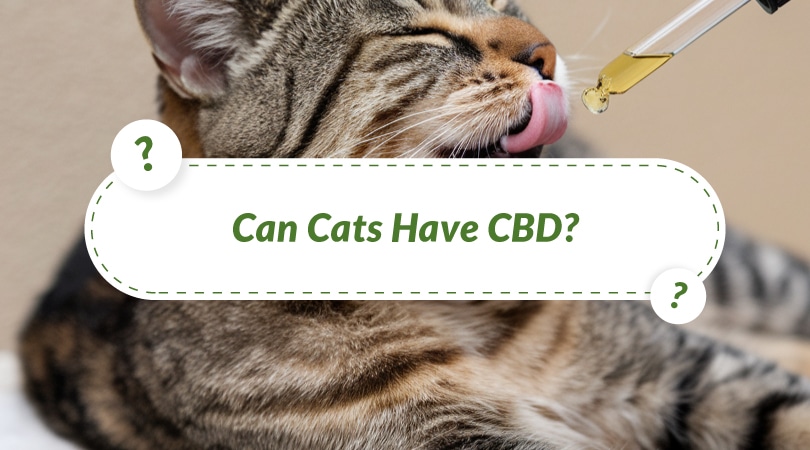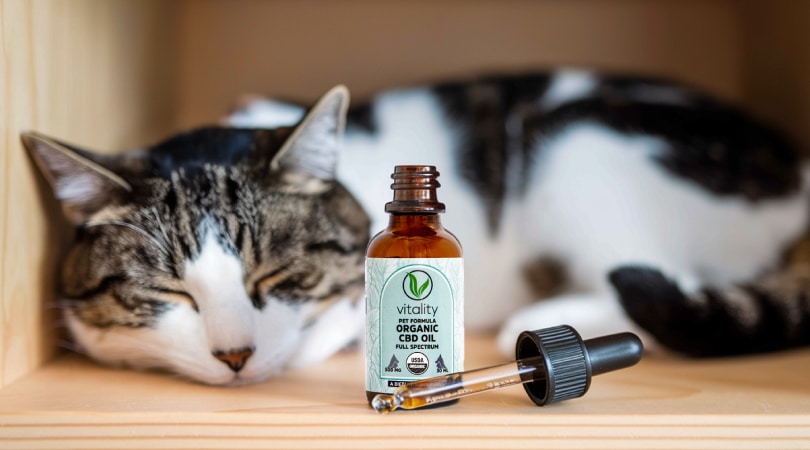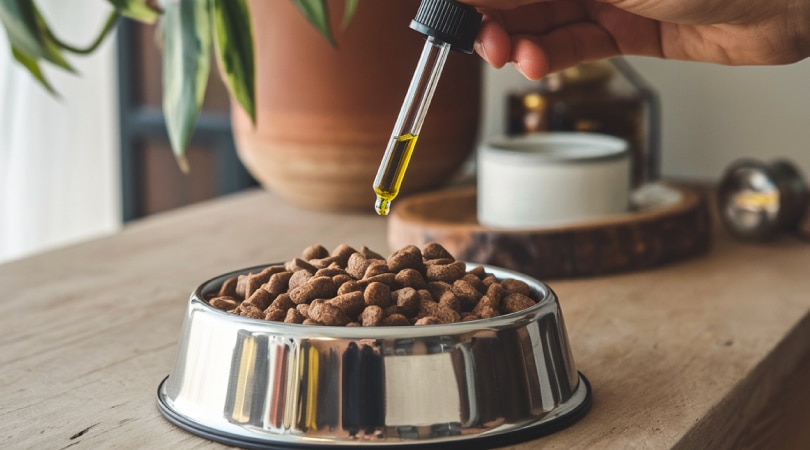
Can Cats Have CBD? Exploring CBD Oil for Cats
Pets are part of the family, and when they are not feeling well—whether due to illness or stress—we want to do everything we can to help them feel better.
Recently, CBD oil has gained attention as a potential ally in alleviating certain conditions in pets, including cats. But can cats have CBD?
Let’s dive into CBD for cats, its safety, how it interacts with them, its potential benefits, what the appropriate dose is, how to give CBD oil to your cat, and more!
What Is CBD Oil?
CBD (cannabidiol) is a natural compound found in the cannabis plant. It doesn’t have psychoactive properties, which actually come from THC, another compound found in cannabis. For pets, especially cats, CBD is available in oil.
Is CBD Oil Safe for Cats?
Before exploring the potential benefits, you may be wondering: is CBD oil safe for cats? While early research and anecdotal evidence suggest that CBD is generally safe for cats, it’s essential to proceed with caution.
The FDA has not yet approved CBD for pets, and there are limited studies specifically on cats. However, many pet owners report positive outcomes when using CBD for various conditions.
Do Vets Recommend CBD Oil for Cats?
Veterinarians often take a cautious stance on CBD for pets because it is not FDA-approved for pets. While some may acknowledge its potential benefits, most recommend waiting for further research to better understand its long-term effects on cats. However, as studies on CBD oil progress, it’s possible this position may evolve.
How Does CBD Oil Affect Cats?
Research into how CBD affects cats is still in its early stages. A study by Kogan et al. used an online survey to gather data from pet owners who had purchased hemp products for their animals. Although only 11.93% of respondents administered hemp products to their cats, they reported mostly positive outcomes.
The most common potential benefits mentioned by cat owners were relief from pain, better sleep, reduced anxiety, and decreased inflammation.

Benefits of CBD for Cats
CBD oil can provide several potential benefits for cats, particularly for anxiety, pain, and stress. Here’s how it works:
Does CBD Help with Anxiety in Cats?
Studies on rodents and in lab-based research suggest that CBD has antianxiety and calming effects. CBD interacts with specific parts of the body called receptors that help control fear and anxiety. These include:
- CB1 receptors, found mostly in the brain, which help manage mood and stress.
- Serotonin 5-HT1A receptors, which are involved in regulating mood and anxiety.
- TRPV1 receptors, which play a role in how the body feels pain and inflammation.
By acting as an indirect agonist of CB1—meaning it helps the CB1 receptor function better without directly binding to it—CBD may reduce fear and stress, potentially preventing anxiety from long-term stress.
CBD for Cats in Pain
CBD oil has shown promise in helping animals, particularly dogs, with pain management, which may provide insight into its potential use for cats. Studies such as Verrico et al. suggested reductions in pain and increased mobility in large dogs with osteoarthritis (OA) when given CBD for 4 weeks at doses between 0.5 to 1.2 mg/kg.
Similarly, Gamble et al. reported decreased pain and increased activity in client-owned dogs given 2 mg/kg CBD twice daily for 4 weeks. Brioschi et al. further supported these findings, noting a reduction in pain severity in OA dogs after 12 weeks of 2 mg/kg CBD twice daily.
Can CBD Help Cats with Seizures?
CBD has shown potential in helping manage seizures in animals, particularly in a 2019 veterinary trial where some dogs experienced around 33% reduction in seizure frequency when given CBD.
Another study suggested that higher CBD doses offered better seizure protection in rats compared to lower doses. According to this 2023 study, a single 5 mg/kg dose of CBD in cats, given with food, reached plasma levels that may be therapeutic, though more research is needed.
Can CBD Help Cats with Cancer?
Although there are no studies analyzing the antitumor effects of CBD in cats or dogs, preliminary research in mice has shown some promise.
In these studies, results suggested that CBD could reduce the formation of polyps in a colon cancer model and decrease lung metastasis.
How to Give CBD Oil to Your Cat
Giving CBD oil to your cat may seem tricky at first, but no need to worry. Here’s a step-by-step guide to help you provide CBD oil to your cat to make sure the process is as stress-free as possible for both you and your pet.
1. Start with the Right Product
Choose a Pet-Specific CBD Oil: Always ensure you’re using a product designed for pets, as human CBD oil may contain ingredients harmful to cats, such as flavors, additives, or higher THC levels. Look for products that are third-party tested for quality and purity.
2. Measure the Correct Dose
Follow Dosage Recommendations: Start with the lowest dose recommended by the product based on your cat’s weight. The usual starting point is around 1–2 mg of CBD per 5 pounds of body weight. You can gradually increase the dosage based on your cat’s reaction.
Use a Dropper for Precision: Most CBD oils come with a dropper, making it easy to administer the right amount. Make sure to read the label carefully to calculate the correct dose per milliliter of oil.
3. Administering the Oil
Directly in the Mouth: The most effective way to give your cat CBD oil is by placing it directly in their mouth. Gently hold your cat, tilt their head slightly, and use the dropper to place the oil in their mouth.
Mixing CBD with Food: If your cat resists direct administration, mix the CBD oil with their wet food or a treat.
Avoid Adding CBD to Water: CBD oil may not mix well with water and can make it difficult to ensure your cat receives the proper dose.

CBD Dosage for Cats
The dosage of CBD oil for cats depends on your cat’s weight and the condition they have. A general guideline is to start with 1-2 mg of CBD per 10 pounds of body weight, but you should always consult your veterinarian for personalized advice. If you have a dog, make sure to also check CBD dosage for your dog.
| Cat Weight (lbs) | Low Dose (mg) | Medium Dose (mg) | High Dose (mg) |
|
5 |
0.5 |
1 |
1.5 |
|
7 |
0.7 | 1.4 |
2.1 |
|
10 |
1 | 2 |
3 |
|
15 |
1.5 | 3 |
4.5 |
|
20 |
2 | 4 |
6 |
How to Find Safe CBD Oil for Your Cat
When choosing CBD oil for your cat, ensure the product is specifically formulated for pets. Look for third-party lab testing to verify purity and CBD content. Avoid products with THC, as it can be toxic to cats. Stick to brands that follow good manufacturing practices and are transparent about their ingredients.
Potential Side Effects of CBD Oil in Cats
While most cats tolerate CBD well, some may experience side effects such as digestive issues, drowsiness, or changes in appetite. If you notice any adverse reactions, discontinue use and consult your veterinarian.
FAQs
Is CBD Oil Legal for Cats?
Yes, CBD oil derived from hemp (containing less than 0.3% THC) is federally legal.
Can You Give Your Cat CBD with Other Medications?
Always talk with your veterinarian before combining CBD with any other medications. As with any other substance or even food, CBD can potentially interact with certain drugs, so professional guidance is crucial to ensure your cat’s safety.
What’s the Best Way to Give a Cat CBD?
The most effective way is to use a dropper to place the CBD oil directly in your cat’s mouth for faster absorption. If your cat is resistant, you can mix it into their food or a favorite treat.
Can My Cat Take CBD Oil for Humans?
It’s best to use CBD products specifically formulated for pets. Human CBD oils may contain ingredients, such as flavorings or higher THC levels, that could be harmful to cats.
Final Thoughts
CBD oil offers promising benefits for cats, particularly in managing anxiety, pain, and other health conditions. If you’re considering CBD for your cat, it’s essential to consult your veterinarian to ensure it’s the right choice for your pet.
If you believe CBD oil could benefit your cat, consider trying Organic CBD Oil for Pets from Vitality.
References
Blessing, E. M., Steenkamp, M. M., Manzanares, J., & Marmar, C. R. (2015). Cannabidiol as a Potential Treatment for Anxiety Disorders. Neurotherapeutics: the journal of the American Society for Experimental NeuroTherapeutics, 12(4), 825–836. https://doi.org/10.1007/s13311-015-0387-1
Brioschi, F. A. et al. (2020). Oral Transmucosal Cannabidiol Oil Formulation as Part of a Multimodal Analgesic Regimen: Effects on Pain Relief and Quality of Life Improvement in Dogs Affected by Spontaneous Osteoarthritis. Animals: an open access journal from MDPI, 10(9), 1505. https://doi.org/10.3390/ani10091505
Coltherd JC, Bednall R, Bakke AM, Ellerby Z, Newman C, Watson P, Logan DW, Holcombe LJ. Healthy cats tolerate long-term daily feeding of Cannabidiol. Front Vet Sci. 2024 Jan 24;10:1324622. https://doi.org/10.3389/fvets.2023.1324622
Corsato Alvarenga I et al. (2023). Scientific Validation of Cannabidiol for Management of Dog and Cat Diseases. Annu Rev Anim Biosci. 2023 Feb 15;11:227-246. https://doi.org/10.1146/annurev-animal-081122-070236
Gamble LJ et al. (2018). Pharmacokinetics, Safety, and Clinical Efficacy of Cannabidiol Treatment in Osteoarthritic Dogs. Front Vet Sci. 2018 Jul 23;5:165. https://doi.org/10.3389/fvets.2018.00165
Inkol JM et al. (2021). Combination therapy with cannabidiol and chemotherapeutics in canine urothelial carcinoma cells. PLoS One. 2021 Aug 5;16(8):e0255591. https://doi.org/10.1371/journal.pone.0255591
Izquierdo I, Tannhauser M. Letter: The effect of cannabidiol on maximal electroshock seizures in rats. J Pharm Pharmacol. (1973) 25:916–7. https://doi.org/10.1111/j.2042-7158.1973.tb09976.x
Jukier, T. et al. (2023). Disposition of a single oral dose of a cannabidiol medication in healthy cats. Frontiers in veterinary science, 10, 1181517. https://doi.org/10.3389/fvets.2023.1181517
Kogan LR et al. (2016). Consumers’ perceptions of hemp products for animals. AHVMAJ.42(3):40–48. https://plenacuraevets.com/wp-content/uploads/2019/10/CSU-Pet-Owner-Survey-copy.pdf
McGrath S, Bartner LR, Rao S, Packer RA, Gustafson DL. Randomized blinded controlled clinical trial to assess the effect of oral cannabidiol administration in addition to conventional antiepileptic treatment on seizure frequency in dogs with intractable idiopathic epilepsy. J Am Vet Med Assoc. 2019 Jun 1;254(11):1301-1308. https://doi.org/10.2460/javma.254.11.1301
Mao K et al. (2015). High dosage of cannabidiol (CBD) alleviates pentylenetetrazole-induced epilepsy in rats by exerting an anticonvulsive effect. Int J Clin Exp Med. 2015 Jun 15;8(6):8820-7. PMCID: https://www.ncbi.nlm.nih.gov/pmc/articles/pmc4537971/
Ramer R, Merkord J, Rohde H, Hinz B. Cannabidiol inhibits cancer cell invasion via upregulation of tissue inhibitor of matrix metalloproteinases-1. Biochem Pharmacol. 2010 Apr 1;79(7):955-66. https://doi.org/10.1016/j.bcp.2009.11.007
Romano B et al. (2014). Inhibition of colon carcinogenesis by a standardized Cannabis sativa extract with high content of cannabidiol. Phytomedicine. 2014 Apr 15;21(5):631-9. https://doi.org/10.1016/j.phymed.2013.11.006
Verrico CD et al. (2020). A randomized, double-blind, placebo-controlled study of daily cannabidiol for the treatment of canine osteoarthritis pain. Pain. 2020 Sep 1;161(9):2191-2202. https://doi.org/10.1097/j.pain.0000000000001896
Whalley BJ et al. (2019). Species-specific susceptibility to cannabis-induced convulsions. Br J Pharmacol. 2019 May;176(10):1506-1523. https://doi.org/10.1111/bph.14165
